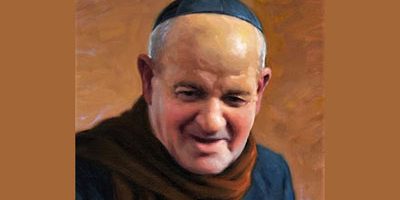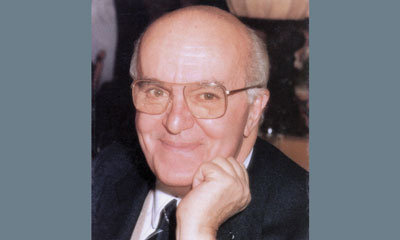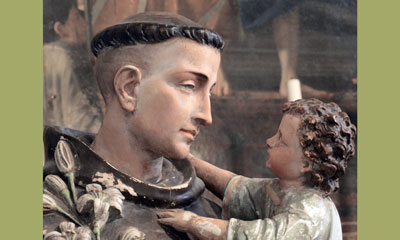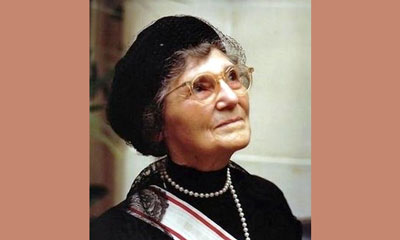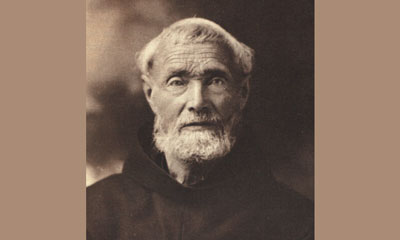August 10, 2016
Saint George Preca
Dear Friends,
“Modern man”, stated Pope Paul VI in the apostolic exhortation Evangelii nuntiandi, “listens much more readily to witnesses than to teachers, and if he listens to teachers, it is because they are witnesses”. St. George Preca put this idea into practice before it was expressed by Paul VI; he used to tell those who were close to him: “We must not stop at preaching the faith, we must live it”. A pioneer in the realm of catechesis and in the promotion of the role of the laity in the apostolate, which would later be encouraged by Vatican II (Apostolicam actuositatem), he is called the “second apostle of Malta”, after St. Paul.
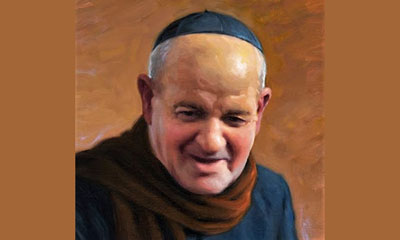 George Preca was born, the seventh of nine children, on February 12, 1880, in La Valette, the capital of the island of Malta, near a shrine dedicated to Our Lady of Mount Carmel. He received Baptism five days later. His father, a well-to-do businessman, would become Health Inspector. Malta was at the time a British colony working towards independence, which would be granted in 1964. In spite of real poverty on the island, the economy was growing. Malta was then 99% Catholic, and had many religious institutions.
George Preca was born, the seventh of nine children, on February 12, 1880, in La Valette, the capital of the island of Malta, near a shrine dedicated to Our Lady of Mount Carmel. He received Baptism five days later. His father, a well-to-do businessman, would become Health Inspector. Malta was at the time a British colony working towards independence, which would be granted in 1964. In spite of real poverty on the island, the economy was growing. Malta was then 99% Catholic, and had many religious institutions.
Saved from the waters
When a child, one July 16, feast of Our Lady of Mount Carmel, George escaped the watchful eye of his governess and fell in the water; he was about to drown when a fisherman, who was passing in his boat, rescued him. “You, like Moses, were saved from the waters!” his disciples would one day like to remind him. In 1888, the Preca family moved to Hamrun, south of the port city of La Valette; there George would make his First Communion and receive the sacrament of Confirmation. He served Mass and, according to the custom of the time, gave catechism lessons to the younger children, an apostolate which he enjoyed and accomplished with zeal. At the age of sixteen, he read St. Alphonsus Liguori’s Preparation for Death. Deeply moved by this book, for the rest of his life he continually recommended it to others. Due to his bad health George did not expect to live long. At this time, he received the scapular of Our Lady of Mount Carmel.
After his secondary studies, he entered the seminary in Malta to study for the priesthood. Soon his zeal and application caused his professors to notice him. He benefited from spiritual direction by a holy priest, Don Luigi Galea; but shortly thereafter, when George became subdeacon, this priest was called back to God. Soon thereafter, he appeared to him and said: “The Lord has chosen you to teach His people”. After his ordination to the diaconate, while staying with his parents in Hamrun, George noticed a group of adolescents in the square in front of the church. Approaching them, he asked for a cigarette and began a conversation. Then, he tactfully raised the conversation up from common banalities to the Passion of Jesus Christ; thus launching his work as a popular catechist. His major concern was to encourage all he met, especially the youngest, to purify their hearts in the light of the Word of God; they could then, in turn, evangelize. He touched in particular the heart of a young dockyards worker, Eugene Borg, who would become the first superior general of the institute which George Preca would found.
But George fell gravely ill. His father called the best doctor on the island to his bedside, who stated: “Your son will die young. He is breathing through just one lung; the other one is completely atrophied… It is useless to buy priestly vestments and a missal for him”. George would later declare that knowing he could die from one moment to the next greatly helped him to be detached from the things of this world. Nevertheless, against all predictions, he was healed; he would attribute this grace to the intercession of St. Joseph. Years later, he would joke about this episode, saying: “My father is dead, the medical professor is also dead, and I am still here to teach the people”.
Ordained a priest on December 22, 1906, he took for his rule of the life the word of his former spiritual director: “God has chosen you to teach His people”. Don George celebrated his first solemn Mass on Christmas day in his parents’ parish, St. Gaetano in Hamrun. On the commemorative card, he had inscribed a prayer asking the Lord to make him think “until the end of his life of glorifying the Church and working for the salvation of souls of the Christian people”. Appointed assistant priest at St. Gaetano, he immediately devoted himself to teaching the youth. In prayer he received the inspiration to start a new foundation: to choose a few young people, form them, and send them out to instruct others. One day, he heard the sacristan explaining to the children, in a catechism lesson, that God created all things. One of the boys asked: “But who created God?” Lacking proper formation, the good man replied: “God created Himself!”
In reality, God is uncreated, for no being can create itself. Don George concluded from this incident: “I understood that catechists must be well formed in the faith and in doctrine”. He was strengthened in his resolve by the presence in Malta of influential English Protestants and proselytizers. The faith of poorly instructed people was seriously in danger, for many, lacking a deep Christian formation, practiced the faith merely through habit and social conformity. An English Biblical society had undertaken a translation of the Bible into Maltese, with the collaboration of one of the most scholarly men on the island, who had become an Anglican. Nevertheless, faithful Catholics had taken the initiative of publishing a journal of apologetics and exercising an apostolate in English for the British.
Museum
Don Preca touched the youth through his friendship impregnated with the desire to share the great love for God which burned in the depth of his soul. His enthusiasm was so contagious that he was able to keep his disciples sitting at his feet for hours. Soon he had gathered around himself a group of young workers. During a gathering, George Preca asked them what name should be given to the nascent society. One of the boys, known for his vivacity and spontaneity, proposed “Museum”. A museum, he explained, gathers together precious objects exposed for all to see and reflect on; similarly, in the “Museum”, one can find Christian doctrine, precious for all. The proposal was enthusiastically adopted. After giving it some thought, Father Preca suggested that the word Museum be considered as an acronym for: “Magister, utinam sequatur Evangelium universus mundus!” (Master, may God grant that the entire world follow the Gospel!). But later the group came to be known as the “Society of Christian Doctrine”.
Don George spent long hours in prayer and left his house only to give evening catechism lessons. He soon decided to keep as his collaborators only young celibate men who would commit themselves entirely to the apostolate. The basis of their spiritual life is meditation on the Last Things and the imitation of Jesus Christ. Don George called them to prepare for a life of sacrifice and self-denial. To illustrate this, he told how, about two years after his ordination, he found himself one day at a crossroads on the way that leads from La Valette to the southern part of the island, and he saw a young boy coming towards him pulling a heavily laden wagon. When he came near the priest, the young man asked him with authority to help him. His first reaction was to wonder who this boy was who was asking a priest to help him with such a servile task. Then, feeling himself filled with an unknown sweetness, he began to help him push the wagon. “I was thinking,” he would admit, “that the passersby, seeing a priest wearing a cassock give himself in public to such activity, would have thought he should be locked up! Only later did I understood the meaning of this episode; the boy symbolized (or was) Christ; the wagon was our work. Christ guides it, and we help Him. In difficult times, I remember that it is Jesus who is pulling our wagon; we can therefore follow Him with closed eyes. If he passes through a roomful of roses, we follow Him, if he passes through a muddy swamp, we continue to follow Him”.
Difficult obedience
Little by little, the rules of life and action were specified: the members of the small society, laymen, celibate, entirely given over to the apostolate and to the proclamation of the Gospel, were to wear modest clothing, live simply, pray and work at their own formation several hours each day, in order to be able to go and instruct others. Centers were opened in several parishes of the island of Malta. In their teaching, the members made use of a booklet entitled “Voice of the Soul”, a collection of words of Our Lord taken from the Gospels and assembled by Don George, who professed a particular devotion for the mystery of the Incarnation; in a short time, all the associates would wear, inscribed on their clothing, the words of the apostle St. John: Et Verbum caro factum est (And the Word was made flesh). In the parishes, the founder also established a Nativity play at Christmas time; still to this day this custom is maintained in almost all the parishes of the island.
However, the enthusiasm and tenacity of Don George faced strong opposition, for the idea of giving instruction directly to the workers was considered at the time to be revolutionary. In 1909, he was ordered by the bishop to close all the centers. He obeyed. However, the trial did not last long; in 1910, along with the reestablished men’s sections, women’s groups of the Society for Christian Doctrine were inaugurated, with the help of Giannina Cutajar who would become the first superior. The men’s and women’s groups shared the same ideal, while remaining totally separate, the superior general serving as the link between the two groups. In 1915, the Society of “Internal Associates” was founded, composed of members who chose to live in community. Finally, in 1960, the archbishop of Malta would approve the association of “Coworkers”; married men, priests, etc., who were inspired by the charism of the society.
Fervent devotees
During the years 1914-1915, Don Preca was the victim of a hostile press campaign; he was even accused of insanity, in particular by members of the higher clergy. He bore the slander with patience and indulgence towards the persons involved, and encouraged the members of the society to remain calm in face of the attacks. In 1916, the new bishop of Malta, Dom Mauro Caruana, a Maltese who had become a Benedictine Monk in Scotland, decided to make an inquest into the conduct of Don George and his groups, which had by that time established themselves in several parishes of the diocese. The founder became thus officially suspect. One day, a priest, probably ordered by the episcopal curia, arrived without warning in the room where Don George was teaching catechism to several youth, and asked him to question one of the boys on a theme of his choice. The chosen boy gave a short exposition on one’s duties towards God, towards neighbor, and towards self, ending with a quotation from St. Benedict-Joseph Labre: “To please God, which is the duty of all, one should have three hearts in one: a heart of fire for God, a heart of flesh for neighbor, and a heart of bronze for oneself”. The conclusions of the inquest and of others that followed were all favorable, and through contact with the reality, all the examiners became fervent supporters of the work. Official canonical recognition would be granted on April 12, 1932.
Don George Preca was a prolific writer; in spite of limited finances, he would publish more than 140 works. To publish and spread his works, he obtained a printing press. At a time when there was no Catholic publisher on the island, he founded in the 1920’s what would become “Veritas Press”. Along with the “Preca Library”, it remains today one of the main Catholic publishing companies in Malta. Among his writings, one can find booklets for meditation and other leaflets on Christian Doctrine, on the Last Things, etc., most of which were composed in Maltese and intended to help the associates in their apostolate. The “Apostrophes” are a collection of veritable acts of faith and trust in God, to be made throughout the day. Here is an example: “Lord God! You are the One who is; I am Your work, work of Your goodness, work of Your wisdom. You have given me a body and a soul made in Your image so that I might know You and acknowledge You as my Creator. But, as You have left me free will, I am in danger of contradicting Your Holy Will if You do not support me with Your grace. I need You constantly; abandon me not in the hour of danger!”
A great net
Don George would often base his teaching on eschatological truths, for, he would say, the consideration of the last things helps us understand the meaning and value of life. He compares these truths to a great net cast into the sea which gathers in all kinds of fish (cf. Mt 13:47): the fear of God is, in fact, the starting point of a path towards the highest summits of holiness. Moreover, these truths give a clear insight into earthly realities: “Whoever has his eyes set on a definitive horizon, has a better intuition into the duties and urgencies of the temporal order” (Archbishop R. Minnerath, Religion, l’heure de Vérité, Artège, 2015, p. 119). Don George’s insistence on eschatology drew him the enmity of those who did not want to hear about it. But the founder was convinced of the importance of these truths, thanks to the writings of St. Alphonsus Liguori (1696-1787), the reading of which had so deeply left its mark on his youth:
“The business of eternal salvation is to us the most important of all affairs; but it is also the most neglected by Christians. They are diligent, and lose no time in seeking to gain a lawsuit, or a situation of emolument. How many measures taken to attain these objects? How many means adopted? They neither eat nor sleep. And what efforts do they make to secure their eternal salvation? How do they live? To save their souls, the greater number of Christians do nothing; on the contrary, they do everything to bring their souls to perdition; they live as if death, judgment, hell, heaven, and eternity were not truths of faith, but fables invented by the poets. If a person lose a lawsuit, or a harvest crop, how great is his pain and distress of mind? With what zeal does he labor to repair the loss? … But if they lose the grace of God, they sleep, and jest, and laugh… Let us then be persuaded that eternal salvation is for us the most important affair—the only affair—and that if once neglected it is an irreparable affair if ever we make a mistake… The affair of eternal salvation is not only the most important, but it is the only affair to which we have to attend in this life… What will it profit us to gain the whole world if we lose our souls? (Mt 16:26). My brother, if you save your soul, it will do you no harm to have lived here in poverty, afflictions, and contempt; for then you will have no more sorrows, and you will be happy for all eternity. But if you lose your soul, what will it profit you, in hell, to have indulged in all the amusements of the world, and to have enjoyed its riches and honors?” (Preparation for Death, 12th consideration).
Our salvation depends entirely upon the grace of God, which is obtained through prayer. That is why St. Alphonsus warned: “Whoever prays is certainly saved; whoever does not pray is certainly damned” (cf. Catechism of the Catholic Church, 2744). Convinced of the importance of prayer, Don George gave himself over sometimes to long nocturnal vigils, absorbed in God. One of his collaborators would bear witness to the fact that everything made him think of God. So he strove to flee everything that could distance him from prayer or harm the apostolate; it was very difficult to get him to accept invitations to academic or secular events. His desire to remain unknown led him to publish anonymously. However, wherever he was, wherever he went, people would run to him for confession, to ask for advice, or simply to hear a word of encouragement. His reputation as a man of God, a man of holiness, spread across the island. Everyone thought he had the gift of reading hearts: many people who had come to consult him left with advice that was perfectly precise, without having had to explain their situations in detail. He also spent many hours in the confessional. Some, however, had difficulty understanding that the fiery and demanding preacher they heard in the pulpit was the same person as the gentle apostle of divine mercy who welcomed them in the confessional.
The source of grace
The Blessed Virgin held a special place in the life and spiritual teaching of Don Preca, as shown by his many homilies on her and his attachment to the order of Our Lady of Mount Carmel. On July 21, 1918, he joined the Carmelite Third Order, and made his promise under the name of Fra Franco, on September 26, 1919, in the convent of Santa Venera. He wished moreover that all the youth participating in his association wear the Scapular of Carmel. But he insisted that the scapular is not a sort of talisman which eliminates the need for daily struggle and prudence in Christian life, but on the contrary is a source of grace to lead the good fight more fruitfully. He recommended that his associates recite the Rosary while meditating on the public life of Jesus; the mysteries which he proposed are similar to the mysteries of light instituted by St. John Paul II in 2002. He also spread the Miraculous Medal, which he considered to be a gift of Mary, and he loved to recount the extraordinary graces obtained through it.
Don George’s love for poverty was such that he refused all personal gifts, only accepting those which were for his associates or the apostolate. The housekeeper who for years took care of the house he lived in, attested that she herself had provided all the furniture there.
In 1952, five members of his lay society were sent to Australia to open new centers. Don George’s initial idea was to give spiritual assistance to the Maltese who had emigrated to Melbourne; later, the scope of the project would be widened. After the death of the holy founder, the society would be called to Sudan in 1983, in the midst of the civil war, to take over a school frequented by both Catholics and Muslims. Today, there are also centers in England, Albania, Kenya and Peru, comprising more than 1,200 people.
In 1958, Don George reached the age of 78; his health began to decline and he was often ill. The doctors advised him to slow down, but in vain. Four years later, the nearness of his death became apparent to all. “The Lord is purifying me,” he affirmed. On July 24th, following a serious attack, he confided to a priest who had come to pay him a visit: “I was at the point of meeting the Lord, and I was already rejoicing…” Two days later, on July 26, 1962, he rendered his soul to God in the town of Santa Venera; it is there that he spent his last days, at a Carmelite community. His last words were for the Virgin Mary. His feast is celebrated on July 26th.
Don George Preca was beatified on May 9, 2001 by St. John Paul II during one of his apostolic journeys to the island of Malta, and was canonized by Benedict XVI on June 3, 2007: “May he help the Church to be always, in Malta and in the entire world, the faithful echo of the voice of Christ, the Incarnate Word!”


